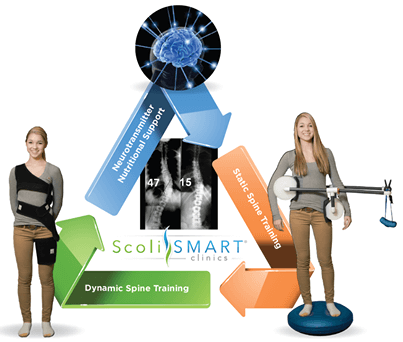Scoliosis is NOT only a spinal curvature, but an entire cascade of hormonal, neurological, and digestive disturbances that manifest the spinal curvature we know as scoliosis. This article discusses 5 common symptoms of scoliosis that are not spine-related.
- Anxiety/Panic
In children with idiopathic scoliosis (IS), this is often observed but not reported until we drill down on history. Many kids with IS will display anxiety symptoms related to social challenges, or show an exaggerated emotional response to otherwise low-stress situations. Many children with IS are described by their parents as ‘dramatic.’ They can get emotionally triggered from situations or experiences that may seem innocuous to others. A couple of hormones that impact these symptoms are progesterone and norepinephrine. When these hormones are imbalanced, or are not getting converted properly, it makes small stressful events seem like major stressful events. Neurotransmitter disruptions are also common in idiopathic scoliosis, and can contribute to these scoliosis symptoms.
- Disturbed Sleep Cycles
There is a cascade of hormones at play in regulating a normal sleep cycle. As examples, estrogen and melatonin are hormones that help you initially fall asleep. Progesterone helps you stay asleep. So when we get into a patient’s history, knowing which component’s of his/her sleep cycle is disturbed clues us in as to which hormones are not balanced properly. All of these 3 hormones are key in normal musculoskeletal development, and all 3 have been implicated in idiopathic scoliosis.
- Late onset of Menstrual Cycle/Irregular Menstrual Cycles
Typically speaking, a girl’s first menstrual cycle coincides with her main puberty growth spurt. On an x-ray, there is a bone cap that starts to develop at this time on top of the pelvic crest. That bone cap becomes the basis for what are called the Risser stages. These stages help clinicians determine the relative risk of a scoliosis becoming worse due to growth. Very frequently, the initial appearance of this bone cap does not coincide with the first menstrual cycle like normal. As an example, some girls we initially evaluate are already well into growth, which is indicative of a lack of hormone signaling for a cycle. Guess what hormone helps with signaling? Progesterone. When progesterone is low, or low relative to estrogen, it results in menstrual cycles being delayed, irregular, or painful. Progesterone also helps to signal bone maturation, and plays a part in activating a brain chemical known as brain-derived neurotrophic factor, or BDNF for short. BDNF helps improve the utilization of serotonin, which is chiefly responsible for long-term postural memory in the brain.
- Low Mood/Introversion/Depression
The lack of progesterone, and hence lack of BDNF production in the brain also influences the emotional centers of the brain. BDNF has recently been the focus of natural and prescription interventions to treat clinical depression. Not coincidentally, children with idiopathic scoliosis report lower than average scores on self-rated emotional health questionnaires, and have a tendency to be introverted. Serotonin also influences these symptoms, which, of course, play a key role in postural regulation.
- Mental Fatigue
I often hear from parents, especially in those patients who’ve had neurotransmitter testing, that their children display improved focus, alertness, attentiveness, and motivation when neurotransmitter support is initiated. However, as we begin to support neurotransmitter support through hormone support such as pregnenolone, DHEA, or certain B vitamins, these treatments actually simultaneously optimize progesterone and estrogen balance.
Although historically hormone testing is only thought to be relative to peri- or post-menopausal women, the hormonal impact on scoliosis development/progression cannot be ignored. If you want the most benefit out of your scoliosis-specific exercise therapy, or bracing treatment, it only makes sense to address every single facet of the scoliosis condition, in order to give your physical treatment the best chance of providing a sustainable long-term outcome.



